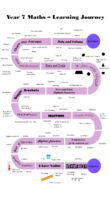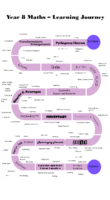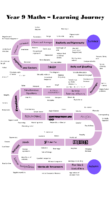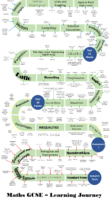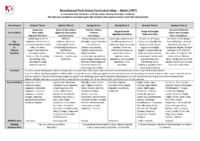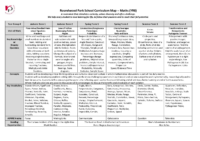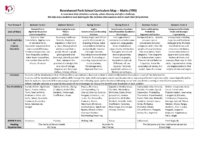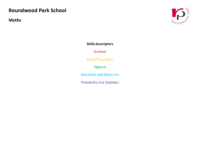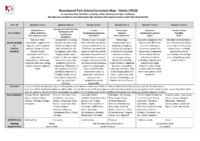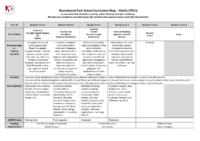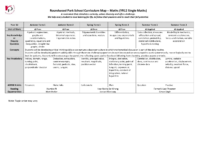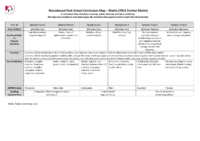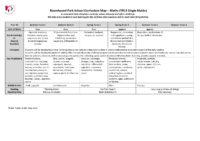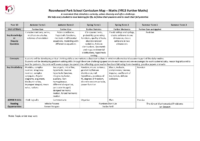Mathematics
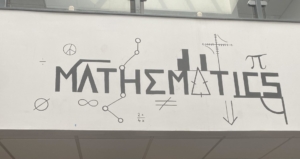
“Mathematicians aren’t people who find maths easy…they are people who enjoy how hard it is!” Matt Parker
Mathematics is incredibly important in our lives and, without realising it, we use mathematical concepts, as well as the skills we learn from doing maths problems, every day. The laws of mathematics govern everything around us, and with a good understanding of them, we can accomplish some truly exceptional things.
We want all of our students to see the beauty of maths, to be proud of their achievements and be supported by passionate staff. We want to foster a love of mathematics, encouraging critical thinking and problem-solving whilst incorporating their ASPIRE learning habits throughout mathematical endeavours. Maths is like playing a musical instrument, sport, gaming, the more you practise the better you become. By practising maths you are training your brain to become fitter and stronger, and to be able to apply these critical thinking skills to a variety of other areas.
All students will have the opportunity to benefit fully from a broad, balanced and challenging programme, which supports their studies across all subjects. We aim to offer a good balance of support and challenge, and encourage our students to be independent and resilient learners.
Key Stage 3 (Years 7, 8 & 9)
In Years 7, 8 and 9 students follow the National Curriculum in which they are required to develop mathematical fluency, reason mathematically and solve problems. The key strands of study across each of the KS3 years include; Number; Algebra; Ratio, Proportion and Rates of Change; Geometry and Measures; Probability and Statistics.
In Year 7, students receive an additional lesson of mathematics per week and the focus of this hour is to improve numeracy skills.
Key Stage 4 GCSE (Years 10 & 11): Edexcel (1MA1)
Students continue to follow the National Curriculum across both Year 10 and 11 with an emphasis on mathematical reasoning and problem solving. The content is structured in the same strands as those at Key Stage 3 with differing emphasis according to the tier of entry.
Regardless of tier of entry, students will sit three 1.5 hour exam papers at the completion of the course, each with equal weighting. One of these papers is non-calculator while the other two are calculators allowed. The focus of the exam papers for the two tiers varies slightly; the foundation tier has a greater proportion of using standard techniques while the higher tier has a greater focus on problem solving.
Key Stage 5 A Level (Years 12 & 13)
Students can choose to study either mathematics or mathematics and further mathematics in the Sixth Form. We follow the Edexcel syllabus. Students will have the opportunity to study:
- Mathematics 9MAO: topics in pure mathematics as well as both statistics and mechanics
- Further mathematics 9FMO: topics in further pure mathematics as well as further mechanics and further statistics content.
Extra Curricular Opportunities
This includes participating in the UKMT Maths Challenges which provide ample opportunity for stretch and challenge of our pupils. We also take part in team events and each year have a group of girls participating in the Maths Olympiad for Girls. In the Spring Term we offer Pi Club, a club aimed at Key Stage 3 students to stretch their problem solving skills and logical reasoning.
We run an Artful Maths club, exploring the beauty in maths through patterns, origami and real world applications. Chess and Board Games club, where students have the opportunity to play logical based games with a range of different year groups. Cubing club where students learn the strategies to solve Rubik cubes and Rubik style problems.
To support our students, we also run drop in sessions across all key stages where students can gain help with any areas of maths they need.
For our Sixth Form students we organise a problem-solving group to develop their logical thinking at A Level and beyond RPS.
Assessment
We have a topic test at the end of each unit, usually two weeks after they have completed the topic, which is followed by a feedback lesson targeted at the areas where students may not have performed so well. Students can then do some further follow up at home by using the Sparx Maths website.
Several of our assessments throughout the year are “Open Book Assessments” which we believe are important for a number of reasons – they allow the students to practise being able to extract key information and follow a worked example; they remove the “test anxiety” that some students face; encourage students to become independent in their revision and require students to continuously keep up with their book polishing to ensure their notes are in good order.
Home Learning
We subscribe to a number of different resources including Sparx Maths, Mathspad and Dr Frost. All students will be given login details for these websites and on occasions home learning will be set on these platforms.
Parents can support their child’s learning by checking the completion of their Maths homework and by encouraging their child to practise their mathematics using Sparx Maths,
